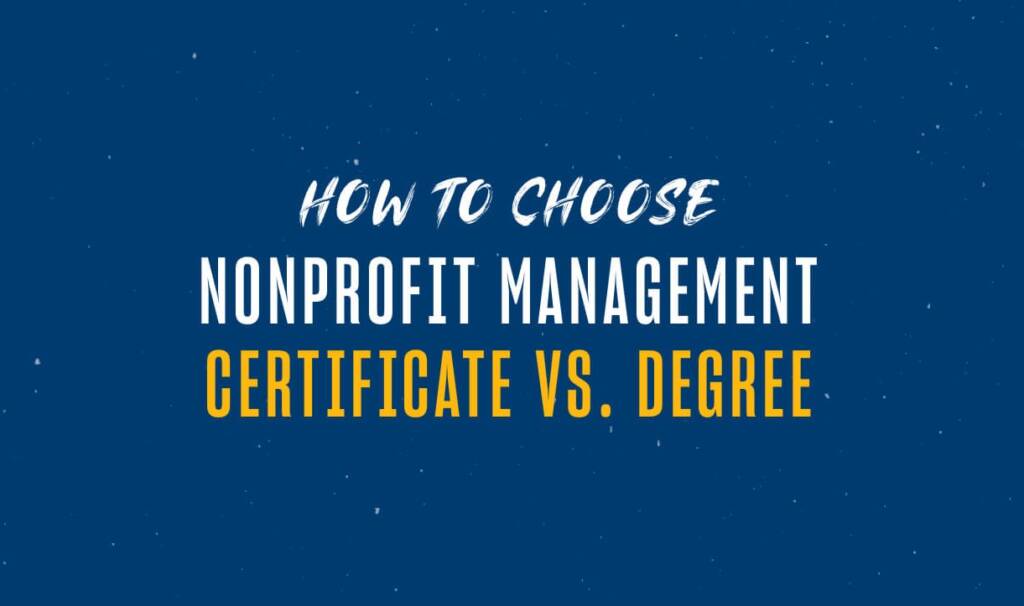For professionals interested in merging their financial expertise with meaningful work, a career as a nonprofit CFO offers the chance to make a significant impact while navigating complex funding streams and regulations.
The role of a nonprofit CFO is both financially demanding and mission-driven, requiring a balance between managing resources and supporting the organization’s greater cause. This guide details what it takes to succeed as a nonprofit CFO, outlining the skills, qualifications and career path that will lead you to the top of the nonprofit financial world.
What Is a Nonprofit CFO?
The Chief Financial Officer (CFO) of a nonprofit is a senior executive responsible for managing and overseeing the organization’s financial operations. Their role largely involves handling key financial functions, including planning, budgeting, accounting, reporting and ensuring compliance with regulatory requirements.
Nonprofit CFOs are tasked with maintaining financial stability, managing cash flow and making strategic investment decisions in service of fulfilling the organization’s mission. They also support fundraising efforts and provide financial insights to the board of directors. Alongside the Chief Executive Officer (CEO), the CFO plays a crucial role in ensuring a nonprofit’s financial health and long-term sustainability.
What Does a Nonprofit CFO Do?
A nonprofit CFO is involved in every aspect of an organization’s finances. Depending on the size of the staff, a CFO may take more of a leadership role and delegate many day-to-day tasks to a manager or finance team; in smaller organizations, the CFO may complete many day-to-day functions themselves.
Working in partnership with the CEO and the Board of Directors, a CFO’s typical responsibilities include:
- Developing and implementing financial strategies, budgets and forecasts, and scenario planning.
- Ensuring accurate and timely financial reporting, including preparing financial statements, managing audits and verifying compliance with regulatory requirements.
- Overseeing cash flow, managing investments and ensuring adequate funding for operations.
- Working with the development team to manage fundraising efforts, grant applications and donor reporting.
- Ensuring adherence to financial regulations and standards and implementing risk management strategies.
- Developing and enforcing financial policies and procedures to ensure proper internal controls and efficient operations.
- Providing financial information and insights to the board of directors and assisting in financial decision-making and strategic planning.
- Leading and managing the finance team, including hiring, training and conducting performance evaluations.
- Communicating financial status and updates to stakeholders, including donors, partners and staff.
CFO at a Nonprofit vs. For-Profit
In general, a CFO’s job description will be similar no matter where they work. However, their responsibilities may be slightly different depending on whether they work at a nonprofit or a for-profit company.
Similarities
- Financial management: Both nonprofit and for-profit CFOs are responsible for overseeing their organization’s financial operations, including budgeting, cash flow management and financial strategy.
- Reporting: Both roles require accurate and timely financial reporting while ensuring compliance with accounting standards and regulations.
- Strategic input on leadership team: CFOs in both sectors provide essential financial insights to support decision-making and contribute to the overall strategic direction of the organization.
- Team leadership: CFOs lead and manage the finance department, including hiring, training and overseeing the performance of financial staff.
Differences
- Mission vs. profit: Nonprofit CFOs focus on aligning financial strategies with the organization’s mission, ensuring funds are used effectively to create desired outcomes and impact, while for-profit CFOs prioritize maximizing profitability and shareholder value.
- Revenue sources: Nonprofit CFOs manage a variety of revenue streams such as donations, grants and fundraising activities, often with restrictions on fund use. For-profit CFOs focus on revenue from business operations like sales, investments and services.
- Financial reporting processes: Nonprofit CFOs must follow specific reporting standards, such as tracking donor-restricted funds and grants. For-profit CFOs focus on financial statements that highlight profitability, such as income statements and balance sheets.
- Focus on compliance and risk: Nonprofit CFOs emphasize compliance with nonprofit-specific regulations and grant management, whereas for-profit CFOs are concerned with corporate regulations, tax obligations and investor requirements.
- Stakeholder interactions: Nonprofit CFOs engage with donors, grant-making agencies and board members, focusing on transparency and accountability. For-profit CFOs primarily interact with investors, shareholders and financial analysts, with a focus on financial performance and returns.
Nonprofit CFO Skills and Education
As with any leadership position, nonprofit CFOs need a mix of technical and interpersonal skills to effectively lead their departments and balance mission-driven work with financial obligations.
Necessary technical (hard) skills include:
- Financial management
- Budgeting and forecasting
- Financial reporting
- Cash flow management
- Fundraising and grant management
- Compliance and regulatory knowledge
- Strategic planning
- Risk management
- Leadership and team management
- Communication and stakeholder engagement
Nonprofit CFOs should also possess a number of critical interpersonal (soft) skills:
- Leadership
- Communication
- Problem-solving
- Strategic thinking
- Collaboration
- Adaptability
- Conflict resolution
- Emotional intelligence
- Time management
- Decision-making
When it comes to education, nonprofit CFOs come from a wide range of academic backgrounds. The one thing they have in common is expert financial acumen, which they can develop through college degrees, professional development courses, certificate programs, on-the-job training or mentorship.
A typical CFO educational track may look something like this:
- Bachelor’s degree in finance, accounting, business administration or a related field.
- Master’s degree in finance, accounting, nonprofit management or business administration (MBA) for advanced knowledge and skills.
- Professional certification, including:
- Certified Public Accountant (CPA)
- Certified Nonprofit Accounting Professional (CNAP)
- Certified Management Accountant (CMA)
- Additional training, including courses or certifications in nonprofit financial management, grant management or strategic planning.
Do Nonprofit CFOs Need Master’s Degrees?
Nonprofits increasingly require leadership candidates to have advanced degrees, so many nonprofit directors earn advanced or terminal degrees related to their profession. While not always mandatory, having an advanced degree — such as a master’s in Nonprofit Management, Business Administration, Public Administration or a related field — can significantly enhance your chances of securing a leadership position in a nonprofit setting.
How to Become a Nonprofit CFO
As previously mentioned, nonprofit CFOs can come from a range of different academic and professional backgrounds. The following is an example of a CFO career path, though yours may look different.
- Obtain a relevant degree
Start by earning a bachelor’s degree in finance, accounting, business administration or a related field. This foundational education provides essential knowledge in financial management, budgeting and accounting, which are key skills for a CFO. - Gain experience
Work in financial roles, such as accountant or financial analyst, to build hands-on experience. Experience with financial reporting, budgeting and audits helps you develop a strong foundation in managing an organization’s finances. - Pursue advanced education
Consider obtaining a master’s degree, such as an MBA or a master’s in Nonprofit Management, to further develop your expertise. Advanced education can provide deeper insights into nonprofit financial management and strategic planning. - Obtain professional certification
Certifications such as CPA or CNAP demonstrate your expertise and commitment to financial excellence. These credentials can greatly enhance your credibility and career prospects. - Develop nonprofit knowledge
Gain specific experience working within the nonprofit sector. Understanding nonprofit-specific financial practices, such as managing grants, donor reporting and restricted funds, is crucial to a CFO’s job. - Build leadership skills
Develop your leadership abilities by taking on roles that involve managing teams and making strategic decisions. CFOs must be strong leaders who can guide a finance team and collaborate with executive leadership. - Network and build relationships
Connect with other nonprofit professionals through conferences, seminars and industry associations. Building a network within the nonprofit community can open doors to new opportunities and provide valuable insights into the sector. - Apply for CFO positions
Once you have gained the necessary experience and qualifications, begin applying for CFO roles at nonprofit organizations. Tailor your applications to highlight your financial expertise, nonprofit knowledge and leadership experience. - Continue professional development
Stay current with industry trends, financial regulations and best practices by pursuing ongoing education and training. Regular professional development ensures you can adapt to changes in nonprofit financial management and remain competitive in your career.
Nonprofit CFO Salary and Job Outlook
Salaries for nonprofit CFOs typically range from $80,000 to over $200,000 per year, depending on factors such as the size of the organization or its budget. Most nonprofit CFOs earn between $120,000 and $150,000, but CFOs working at larger nonprofits or for those with significant budgets may earn salaries far exceeding that range.
Compensation can vary significantly based on location, with nonprofit CFOs in metropolitan areas often receiving higher salaries compared to those in rural locations. For financial professionals aspiring to a leadership role, the demand for nonprofit CFOs is expected to grow as organizations increasingly seek experienced financial leaders to manage complex funding streams, regulatory requirements and financial sustainability.
Career advancement and salary opportunities are largely influenced by years of experience, with more seasoned CFOs securing higher compensation. Holding advanced degrees, such as an MBA, or professional certifications, such as a CPA or CNAP, can also lead to better career prospects and higher salaries.
As financial pressures and scrutiny within the nonprofit sector increase, the role of the CFO is becoming more critical, leading to expanded responsibilities and new opportunities. CFOs can further enhance their career prospects and salary potential through continuing professional development and staying updated on nonprofit financial practices.
Are You Ready to Become a Nonprofit Leader?
Nonprofit CFOs have a unique opportunity to make a significant impact on organizations working for social good. From managing finances to supporting fundraising efforts, nonprofit CFOs play a crucial role in ensuring the financial health and sustainability of their organizations. If you are passionate about combining your financial expertise with a mission-driven career, now is the time to take the next step toward becoming a nonprofit financial leader.
The online Master of Science in Nonprofit Leadership and Management (MSNP) program at the University of San Diego equips aspiring nonprofit CFOs with the knowledge, skills and credentials needed to excel in this role. With a focus on financial management, strategic leadership and the unique challenges facing the nonprofit sector, this program can help you advance your career and make a lasting difference. Explore the MSNP degree at USD today and prepare to lead the financial future of nonprofits with confidence.




![6 Nonprofit Careers [Job Titles, Salaries & Outlook Explained]](https://onlinedegrees.sandiego.edu/wp-content/uploads/2023/10/MSNP_Blog_6NPCareers-1024x576.png)